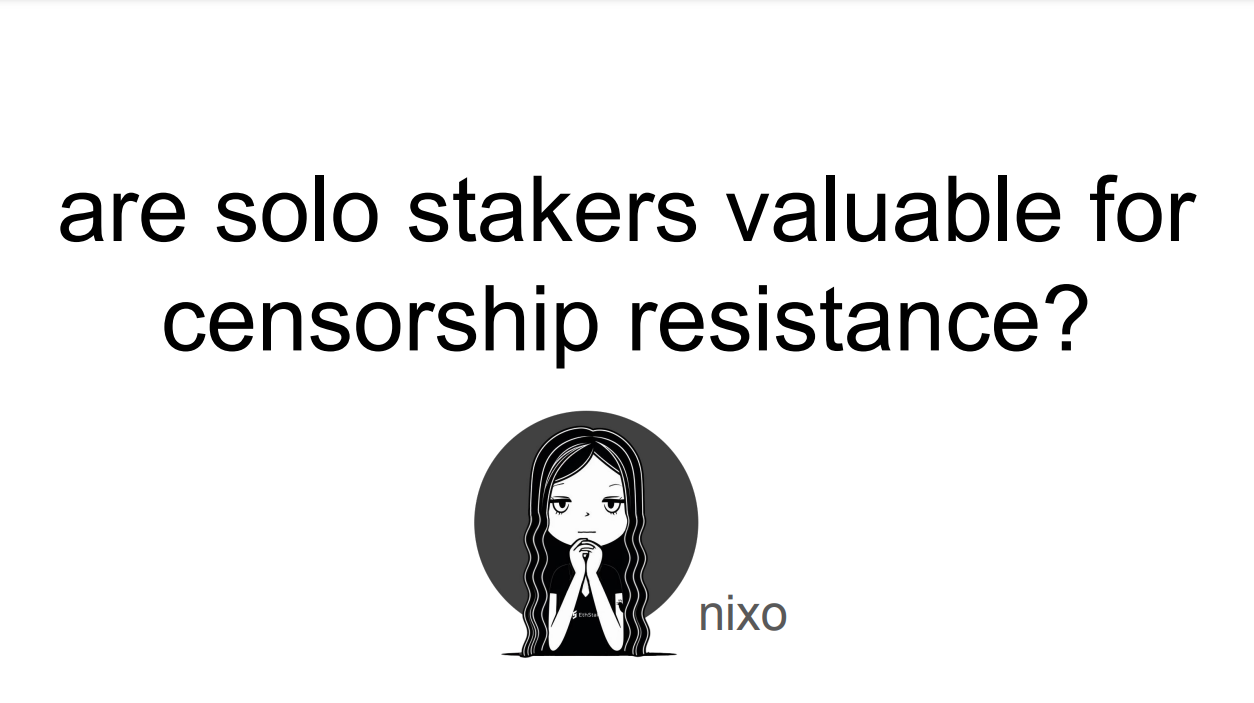Are Solo Stakers Valuable for Censorship Resistance ? - Censorship.wtf
Source : https://www.youtube.com/watch?v=K95VU053CnQ


Nixo leads a staking community called EthStaker that supports network and validators decentralization. They do this by creating resources, tools, and events for stakers.
Solo stakers as a fallback

Solo stakers make up a small percentage of validators but are a critical line of defense, acting as auditors. If censorship occurs, they can participate in a censorless way without governance.
The ability to censor


Large staking entities are more likely to censor because they have obligations to customers and want to maximize rewards via MEV. Builders and relays control censorship here.
Solo stakers face less pressure, are abundant in number, and are decentralized geographically and technologically. It's difficult to target them.
Solo stakers can build local blocks blindly, avoiding censorship. Using MEV-boost, they can set a minimum bid threshold to take boosted blocks or build locally if it's below that threshold.
Who are solo stakers ?


The left slide shows EthStaker YouTube channel showing solo stakers represent are a highly engaged subgroup ranging from less to more technical.
Less technical solo stakers follow setup guides, while more technical ones write setup guides and help troubleshoot issues, proud of running validators as a hobby.
Nixo considers herself on the less technical end, having set up a validator. This is a good position to bring more people into solo staking.
EthStaker streams on network upgrades and guides on hardware shopping and node operation indicate interest in solo staking.
Technical solo stakers eagerly re-engage with the staking community to help others get started and deal with problems. Nixo argues that if she can run a validator as a less technical person, anyone can potentially do solo staking.
They fundamentally care about the network




Solo stakers understand how to update, upgrade, and troubleshoot their nodes. They care fundamentally about the network health.
Liquid staking token holders and staking-as-a-service customers mostly want to maximize rewards, requiring less network understanding. Their interests can influence operators.
In 2021, there was a successful grassroots campaign to improve client diversity from a Prism supermajority to a more balanced consensus layer :
- Data on execution layer clients overrepresents solo stakers
- Data on validator clients overrepresents large staking pools
This shows solo stakers better support network decentralization.
Rocket Pool data indicates their mostly home staker validators run more minority clients like Lighthouse and Nimbus compared to the overall validator preference for Prism and Lighthouse. This demonstrates home stakers' engagement with network health.
The top upvoted posts on r/ethstaker concern :
- Liquid staking centralization
- Client diversity campaigns
- Technical guides
This shows what the solo staking community prioritizes.
They are careful



Solo stakers are concentrated in developed nations like the US, Germany, and UK, which is not ideal for geographic decentralization.
The EthStaker community has had an outsized influence on solo staking resources and participants, with its knowledge base now translated into 7 languages to help improve validator diversity.
Solo stakers tend to be very risk averse, recently turning down a token airdrop to staking addresses to avoid any chance of compromise.
Some have also asked about whether transactions should be censored due to local regulations, wanting clarity that they are not liable as they are just running computers for rewards, not deliberately enabling illegal activities.
Sum up
Solo stakers…
- Understand the fundamental nature of staking
- Are engaged (pay attention to network development)
- Place a high value on network health and decentralization
- Are careful (need clarity!)
- Are motivated by stable income and security in their investment
Ending


In summary, solo stakers do not have a major daily impact on censorship resilience since most use MEV Boost, putting censorship decisions in builders and relays’ hands.
However, they act as a critical social layer fallback and “night’s watch” in exceptional situations threatening censorship.
To keep them participating, we should provide more resources, education, support, and accessibility through translating to more languages.
We should also solidify validators as neutral parties without censorship responsibility, make local block building less costly, and improve MEV-Boost options like relative minimum bid values.
Right now, solo stakers can enable local block building or minimum bid values. Though they fly under the radar in normal conditions, solo stakers form a last line of decentralized defense when under threat, so supporting and growing their ranks is essential.